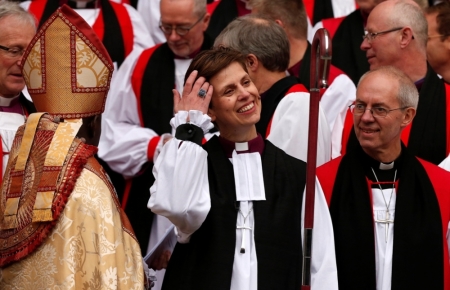Conservative Anglicans Discuss Breaking Apart From Church of England Over Gay Marriage, Women Bishops

A group of conservative Anglican leaders are reportedly meeting in London to discuss forming a "parallel" church that they feel would be more true to Anglican principles on positions like women bishops and gay marriage.
The Independent reported that The Church of England is "at risk of an unprecedented schism" in light of the proposal by the Global Anglican Futures Conference, which seeks to counter what conservatives find is a liberal approach to social issues by the Church of England and the Archbishop of Canterbury.
In 2014 the Church of England broke from centuries of tradition when it voted in approval to allow women to become bishops, which was celebrated by top Anglican leaders. In January 2015, the Rev. Libby Lane was ordained as the Bishop of Stockport, becoming the first-ever female to hold such a high position within the Church.
The CofE, however, maintains its support for traditional marriage between one man and one woman, and has revoked clergy rights of priests who have been married to same-sex partners.
Issues have formed in certain cases, however, for example with criticism over Uganda's anti-gay law last year, which at one point threatened repeated homosexual offenders with the death sentence.
The Anglican Church of Uganda threatened to leave the Communion due to what it saw was meddling in the affairs of its country.
"The issue here is respect for our views on homosexuality, same-sex marriage as a country and church. If they are not willing to listen to us, we shall consider being on our own," Uganda Anglican Archbishop Stanley Ntagali said in March 2014.
Gafcon, formed in 2008, has called for an end to "secularism" in the mainstream Anglican Communion, and is believed to be thinking about ordaining new church leaders in order to defend the "essential truths of the biblical faith."
Archbishop of Canterbury Justin Welby said back in December 2014 that he fears the Anglican Communion may experience schism because of the debates on social issues.
"I think, realistically, we've got to say that despite all efforts there is a possibility that we will not hold together, or not hold together for a while," Welby said in an interview.
"I could see circumstances in which there could be people moving apart and then coming back together, depending on what else happens."
Some Anglican conservatives, such as Andrea Williams, director of pro-gay therapy group Christian Concern, suggested that this schism within the Church might indeed become a reality if the CofE eventually drops its opposition to gay marriage.
"The Bible is clear about what marriage is and the church has not gone soft on that issue. But, if it were to, that might be the red line in the sand," Williams said.





















